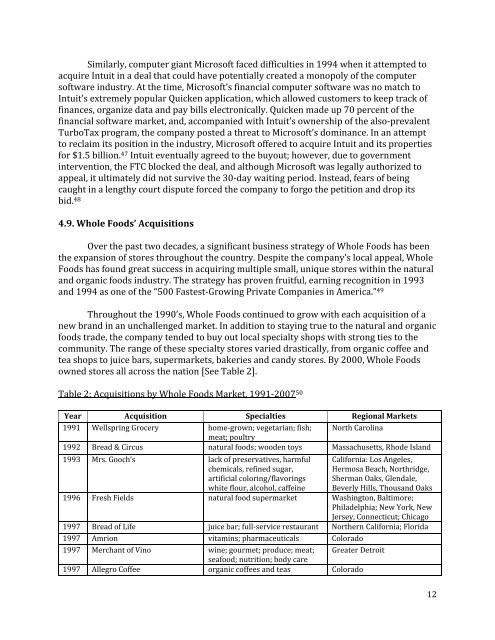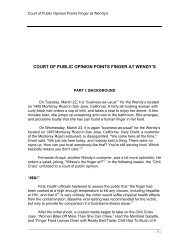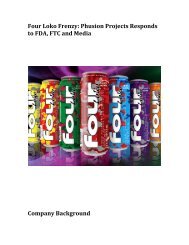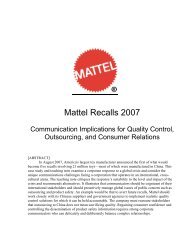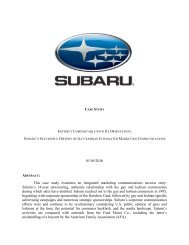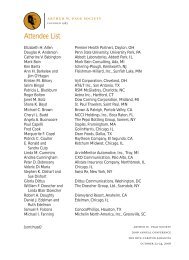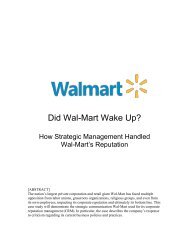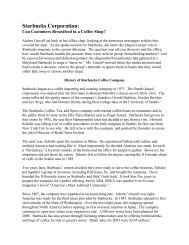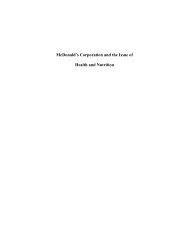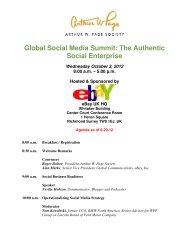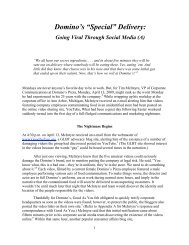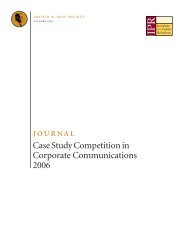Whole Foods/Wild Oats Merger: - The Arthur Page Society
Whole Foods/Wild Oats Merger: - The Arthur Page Society
Whole Foods/Wild Oats Merger: - The Arthur Page Society
You also want an ePaper? Increase the reach of your titles
YUMPU automatically turns print PDFs into web optimized ePapers that Google loves.
Similarly, computer giant Microsoft faced difficulties in 1994 when it attempted to<br />
acquire Intuit in a deal that could have potentially created a monopoly of the computer<br />
software industry. At the time, Microsoft’s financial computer software was no match to<br />
Intuit’s extremely popular Quicken application, which allowed customers to keep track of<br />
finances, organize data and pay bills electronically. Quicken made up 70 percent of the<br />
financial software market, and, accompanied with Intuit’s ownership of the also‐prevalent<br />
TurboTax program, the company posted a threat to Microsoft’s dominance. In an attempt<br />
to reclaim its position in the industry, Microsoft offered to acquire Intuit and its properties<br />
for $1.5 billion. 47 Intuit eventually agreed to the buyout; however, due to government<br />
intervention, the FTC blocked the deal, and although Microsoft was legally authorized to<br />
appeal, it ultimately did not survive the 30‐day waiting period. Instead, fears of being<br />
caught in a lengthy court dispute forced the company to forgo the petition and drop its<br />
bid. 48<br />
4.9. <strong>Whole</strong> <strong>Foods</strong>’ Acquisitions<br />
Over the past two decades, a significant business strategy of <strong>Whole</strong> <strong>Foods</strong> has been<br />
the expansion of stores throughout the country. Despite the company’s local appeal, <strong>Whole</strong><br />
<strong>Foods</strong> has found great success in acquiring multiple small, unique stores within the natural<br />
and organic foods industry. <strong>The</strong> strategy has proven fruitful, earning recognition in 1993<br />
and 1994 as one of the “500 Fastest‐Growing Private Companies in America.” 49<br />
Throughout the 1990’s, <strong>Whole</strong> <strong>Foods</strong> continued to grow with each acquisition of a<br />
new brand in an unchallenged market. In addition to staying true to the natural and organic<br />
foods trade, the company tended to buy out local specialty shops with strong ties to the<br />
community. <strong>The</strong> range of these specialty stores varied drastically, from organic coffee and<br />
tea shops to juice bars, supermarkets, bakeries and candy stores. By 2000, <strong>Whole</strong> <strong>Foods</strong><br />
owned stores all across the nation [See Table 2].<br />
Table 2: Acquisitions by <strong>Whole</strong> <strong>Foods</strong> Market, 1991‐2007 50<br />
Year Acquisition Specialties Regional Markets<br />
1991 Wellspring Grocery home‐grown; vegetarian; fish;<br />
meat; poultry<br />
North Carolina<br />
1992 Bread & Circus natural foods; wooden toys Massachusetts, Rhode Island<br />
1993 Mrs. Gooch’s lack of preservatives, harmful<br />
chemicals, refined sugar,<br />
artificial coloring/flavorings<br />
white flour, alcohol, caffeine<br />
California: Los Angeles,<br />
Hermosa Beach, Northridge,<br />
Sherman Oaks, Glendale,<br />
Beverly Hills, Thousand Oaks<br />
1996 Fresh Fields natural food supermarket Washington, Baltimore;<br />
Philadelphia; New York, New<br />
Jersey, Connecticut; Chicago<br />
1997 Bread of Life juice bar; full‐service restaurant Northern California; Florida<br />
1997 Amrion vitamins; pharmaceuticals Colorado<br />
1997 Merchant of Vino wine; gourmet; produce; meat;<br />
seafood; nutrition; body care<br />
Greater Detroit<br />
1997 Allegro Coffee organic coffees and teas Colorado<br />
12


